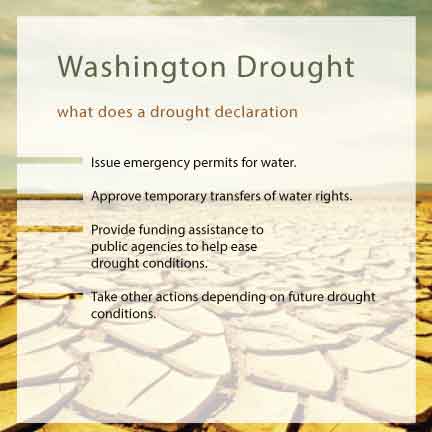Lack of snow causes drought

“We’re really starting to feel the pain from this snowpack drought. Impacts are already severe in several areas of the state.” Jay Inslee, Washington state Governor
May 28, 2015
Washington state governor Jay Inslee declared a statewide drought on May 15, the first since 2005.
The Office of the Washington State Climatologist recorded a record rainy season from October 2014 to March 2015, which has resulted in a lack of snow on the mountains. During that period of time the average temperature was 40.5 degrees Fahrenheit, only 4.7 degrees above the 20th century long-term average and ranked as the warmest October through March on record.
Under Washington state law chapter 173-166, a drought emergency can be declared if an area is experiencing, or is predicted to experience, a water supply that is below 75 percent normal and if the people living in those areas will likely suffer from a water shortage.
In April, the United States Department of Agriculture’s Natural Resources Conservation Service (NRCS) recorded Washington state’s snowpacks melting earlier than normal.
The NRCS found on May 1, 11 snow sites that are clear for the first time in recorded history.
Snowpack is a third source of water for rivers and lakes and is a relied on source of groundwater recharge during spring, summer and fall, according the Washington Department of Agriculture.
“We’re really starting to feel the pain from this snowpack drought. Impacts are already severe in several areas of the state,” said Inslee in his press release. “Difficult decisions are being made about what crops get priority water and how best to save fish.”
Hector Castro, communications director for the Washington Department of Agriculture, said they predict a $1.2 billion crop loss this year because of the drought.
“What that will mean for other parts of the state economy is hard to say, but it will certainly have a significant impact,” said Castro.
In response, the Washington State Department of Ecology has requested a little more than $9.5 million from the Legislature for drought relief and has already started drought relief work with existing funds.
For eastern Washington, the main concerns are boosting water supplies for agriculture and protecting fish species.
“In general, our biggest role will be to assist those with a water supply affected by drought with changes to their water rights,” said Brook Beeler, communication manager at the Eastern Region Office of the Department of Ecology. “This could mean temporarily moving the location of a well or finding an alternate supply through another water right holder.”
Beeler said the Department of Ecology will likely require people with surface water rights, many of which are for outdoor irrigation and agriculture, to reduce their water usage. The call will be made when water levels in the Colville and Little Spokane rivers fall below what is usually required for regular water usage.
“This is something that happens in dry years, but this year the drought will exacerbate the problem and it will likely happen sooner,” said Beeler.








